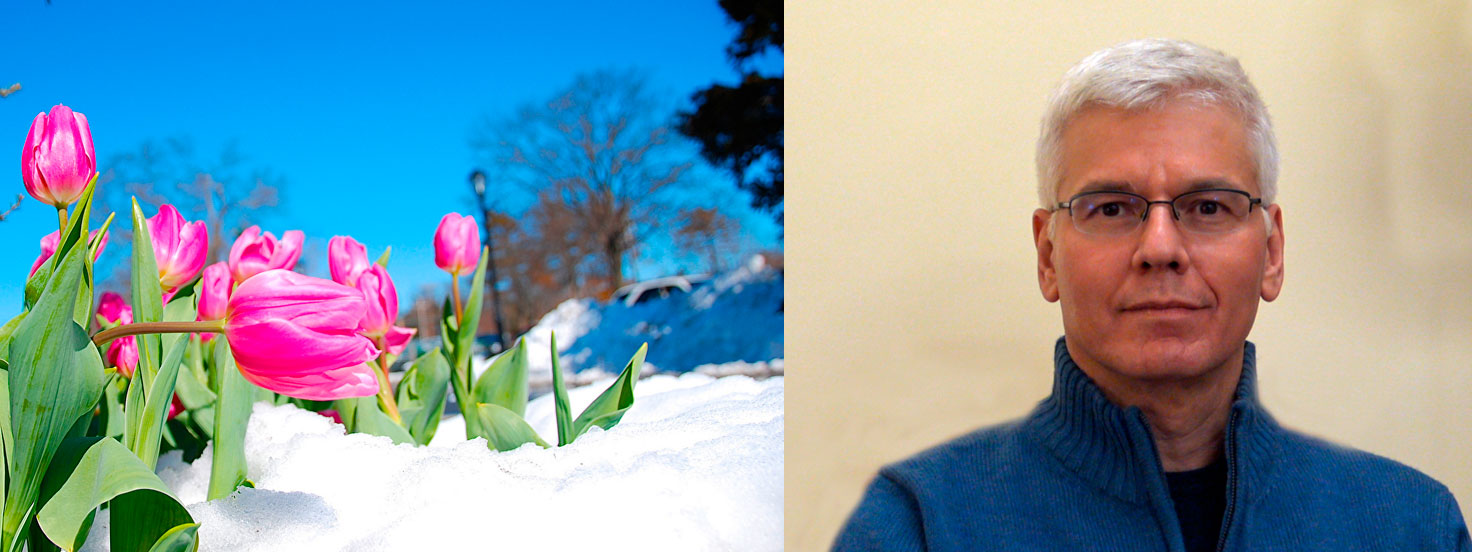
Forcing the Spring – Ben Consigli
“For behold, the winter is past; the rain is over and gone. The flowers appear on the earth, the time of singing has come, and the voice of the turtledove is heard in our land.” (Song of Solomon 2:11-12)
Father Timothy Healy, S.J., an American priest and former President of Georgetown University and the New York Public Library, believed that as Christians when we are frozen in our “winters” of anxiety or past frustrations or helplessness, we must “force the spring.” A spring reborn out of its ordinary time/season, amid a pandemic, that generates a vision and courage to reinvent our world. How do we, as Marist leaders, do this, to force the spring, in our day and time? It might be by the words we speak and the actions we take. No simple task, but it is what we are called to do.
Throughout the world, we are all in different stages of the COVID-19 pandemic—maybe you were in an epicenter or maybe you had the good fortune of being in a community that was not hit hard. Or perhaps you have experienced a deep personal toll. We are all trying to pick up the pieces of shattered norms, sheltering at home, wearing masks, social distancing, trying political leadership, devastating personal loss, and enormous economic turmoil. In so many ways, we are anxious to press the “reset” button.
Our response as Marists to this pandemic demands that we are intentional in the way we exercise the influence and responsibility invested in us. History will judge the impact of our decisions on the legacy of this virus not just in our communities and provinces, but also in our regions and the world at large.
Leadership and Innovation
What kind of leadership works when past norms no longer have meaning or are even possible? In these seven-plus months since the virus shut down so many parts of our world, I have learned that leadership requires reading the signs of the times, quick-thinking, prayerful discernment, flexibility, calm, confidence, visibility, communication, moral courage, caring, faith in God, and disciplined decision-making. Leadership matters: it always matters.
There were certainly “winter” moments in Marcellin’s life—the vocation crisis of 1822, his illness of late 1825/early 1826, the crush of the creditors wanting to be paid, the dismissal of his first recruit in 1826, the “abandonment” of Marist Fathers Courveille and Terraillon when they left the Hermitage, the institution of the Guizot Law in 1833, and the failure in 1838 to obtain legal approbation of the Institute. These were times when Marcellin was tempted to give up or when he doubted, albeit briefly, if things were going to work out. We see a man seriously “churning” these things over and over in his heart, his mind, and his gut, but he was not defeated by them. He was sure that if it were in God’s plan, “all would be well.” This is the type of optimism which Marcellin embodied.
Marcellin was also able to adapt plans or approaches to fit changes in situations. Let us look at the situation created in 1833 by the passage of a new education law, the so-called Guizot Law. The “Guizot Law,” passed on 28th June 1833, required that free primary school education must be made available to all everywhere in France’s 37,000 communes. Each commune was responsible for having a primary school in which all the teachers had their “brevet”(teaching certificate). The exceptions to this were the Brothers or Sisters belonging to a religious organization which had legal authorization to teach. Since Marcellin’s Institute did not have legal authorization to teach, each Brother had to have his brevet. With this law, brevets could only be issued by the University; Former brevets, unless granted by the University, were no longer recognized. Without their brevets and without legal authorization of the Institute from the government, the Brothers, upon reaching the age of twenty, could be conscripted into military service for seven years. Clearly, this new education law seriously threatened the life of the Institute.
What was Marcellin’s practical and creative response? Of his letters which have survived, Marcellin wrote sixteen letters to Father Mazelier, superior of the Congregation of Brothers of Christian Instruction of the Diocese of Valence, concerning merging their two groups. Why? First off, Mazelier’s group received legal authorization in 1823…and thus his group of Brothers fulfilled the Guizot law. Marcellin did not want to run the risk of seeing his Brothers (twenty years of age and older) go off to do seven years of military service or paying a large amount of money to some other young men to do military service in place of the Brothers. So, in an arrangement with Mazelier, Marcellin entrusted his Brothers who turned twenty to Mazelier. This whole process began when the first four Marist Brothers went to St.-Paul-Trois-Châteaux on 13th June 1835 and continued over the next number of years (until the Institute and Mazelier’s group merged in 1842):
“Here we come again this year to ask your help for the four subjects I am sending you. Without the help you give us, these subjects would be in real danger.” ( Letter to Monsieur François Mazelier; St. Paul-Trois-Châteaux, Drôme; 1836-05-08; PS 065 )
By sending those Brothers who were about to turn twenty years of age to Mazelier, Marcellin adapted his position/ideas to the political and social reality facing him for his greater aim: to have Brothers to educate the youth of the area. Another reason why Champagnat was willing to make this adaptation is seen in his July 1836 letter to Mazelier:
“The Superior General of the Society (Jean Claude Colin) has told me of the plans for union about which you spoke with him and which I myself had been thinking about for a long time. After discussing it together, we believed that this union would be for the glory of God and the good of religion. On both sides, we have the same aim, which is the Christian education of children, and the means we use to accomplish it are the same, apart from some minor differences.” ( Letter to Monsieur François Mazelier; St. Paul-Trois-Châteaux, Drôme; 1836-07; PS 066 )
The aim of both groups was the same–the Christian education of youth. Marcellin was willing to do what was necessary to insure that this important work would continue. He changed the paradigm to respond to the reality he confronted. He “forced” the spring.

Needed Change For a New World
Besides the speed of needed change, the challenges of these past months have included redesigning online learning, staff meetings on the fly, reflecting on the economic impact of the virus, and developing crash courses on initial formation programs, but to name a few. Despite the fears and anxieties caused by this pandemic, many Marists have listened with an ear to the ground like never before and allowed all the ingenuity, testing of new practices, and innovation possible. This takes grit and resilience. These are experiences we want to learn from when we reset for the future. In times of great challenge, I have found it important to have a solid footing on how I approach my own actions and decisions. Empathy, compassion, and discernment have proven, time and again, to be vital anchors for me during any crisis, often leading to answers and responses that are not immediately obvious. We will need these anchors—and more—as we discern what our Marist mission will look like and what it will be in the future. The questions presented to the delegates of the XXII General Chapter in Rionegro, Colombia, still resonate, now more than ever, during this pandemic:
- What is God calling us to be?
- What is God asking us to do?
In his recent circular, “Homes of Light”, Brother Ernesto articulated the type of leadership which Marcellin exhibited and encourages us to follow in his footsteps:
“Marcellin was always attentive to discern the voice of God in the events of life and in his personal prayer. His boldness made him open and flexible to develop new responses without getting bogged down in pre-determined schemes. He gave himself to the education and evangelization of youth, giving priority attention to the most abandoned. He did all this while building up a spirit of brotherhood, forming homes of light. He had the intuition that the witness of a group is always more powerful than that of an individual. We Marists of Champagnat have these and other characteristics that Marcellin gave us in our DNA. They continue to light up our path today.” ( Brother Ernesto Sanchez Barba, Homes of Light, p. 14. )
Will we
go back to “normal” when we press the reset button? I hope not. We have learned
not to waste. We have learned how to virtualize everything: community
communications, meetings, visits, education, prayer services, formation, and
seminars. During the times of lock-down, we have tried to build up a spirit of
fraternity in our communities and in our homes.
We have learned to do things differently—what is value-added and what is
not—and hopefully we will continue to lay out an indelible image of what being
Marist is all about. Let us not lose these advances when we reset. Together,
let us “force the spring”.
Br. Ben Consigli, General Councillor
